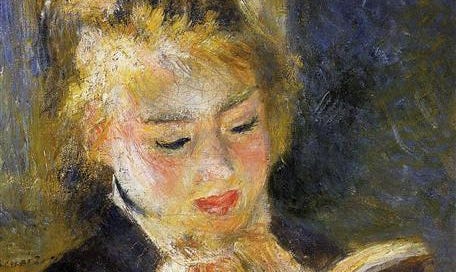From Jeremy:
I wanted to ask you what you think are some of the biggest challenges facing adult common readers today.
His answer is at the end. Some thoughts.
Reviews. A lot of books get published and a lot of reviews. But most reviews are about the same books and are too long—and they give away the plot! I would like to see more composite reviews and more impressionistic ones. Notable that Goodreads is successful at this but most “Books” sections are not, noting that they do a very good job of what they set out to do.
Structure. If you want to read the classics, what is it that you actually should read? There are a lot of reading lists out there and finding the book on that list which you want to read right now is the challenge. Go to the library and keep starting books until you find something you have to take home. Or honestly, just read Jane Austen. Making reading lists for yourself is good. Or picking areas to move around in.
Understanding. People often don’t know enough about the books they read. In my salon series How to Read a Novel we have been talking about what the six novels we studied actually mean. Looking at the historical context, the specific language, the literary references all matters and you have to learn that way of reading as you go. (That’s why re-reading is important.) This is not about reading a book and seeing what you think. Literature is a form of knowledge too. Use Wikipedia. Use The Oxford Companion to English Literature. Read the introduction and the notes!
Talking. You need someone to talk to about the books you read. That’s partly how you get the reading skills from point 3, but it also helps you understand what you think. That’s why blogs, salons, etc, are so popular with readers. It’s what makes the Dickens Chronological Reading Club so useful. You can talk to yourself also. Or maybe an orangutang.
You. You need to go back to books you didn’t “get”. The whole point of reading is to become a better reader. I used to find Austen outside of P&P and S&S pretty unreadable. Now I am an addict. The more you read the easier it is for you to meet a novel on its own terms. The upfront costs are easier to absorb as a child than an adult. So just dive in and swallow up books like a child.
Taste. Perhaps all of this can be summed up as saying you need to learn good taste (good link, recommended.) This is not about being a cultivated person or being well-read. It’s about acquiring the knowledge to understand great books. That takes a lot of time and isn’t for everyone. Read what you want to read! Yes, reading the classics from all times and cultures is a good thing, but not exclusively. I have read shelves and shelves (and shelves) of what some people would call pulp and I wouldn’t take most of it back.
Other than reading this blog, what can you do? I will run a follow-up to my salon series How to Read a Novel if people are interested. It’s essentially an online book club but where I lecture you a bit about literature. I’m planning to run How to Read a Poem next but there’s no reason we can’t do both. I got emails from people during How to Read a Novel that were *so* insightful.
I am also thinking of making some reading lists—let me know if that would be useful. Or you could ask chatGPT. I tried that and the list was a pretty good starting point.
We could also have a read along here. I can make a list of twelve book that would be profitably read as a cluster and we can read them one a month and have comments and discussion online. Let me know what you think.
Here are Jeremy’s thoughts.
The Internet is simultaneously one of the biggest aids to the common reader in terms of introducing her to so many different books and points of view that she might otherwise have never heard of, and it is also one of the biggest hindrances to her efforts due to sheer volume of articles, blogs, essays, videos, etc. You know, the smorgasbord of endless stuff that is the Web. Also, here in the States, wanting to read books and be a reader is, to me at least judging from comments I get from some people out where I live, a waste of time unless one is trying to earn money. What do you see, in your own life and just more broadly in British and American culture, as being obstacles to the common reader today?
I don’t entirely disagree but if you want to be a reader then do so and ignore the rest. You only get one life and you can get a lot read in even just an hour or two a day.
Thanks for reading. If you’re enjoying The Common Reader, let your interesting friends know what you think. Or leave a comment.
If you don’t subscribe to The Common Reader, but you enjoy reading whatever’s interesting, whenever it was written, sign up now.





I am delighted that my question received such a thoughtful, considered response! Loved this essay, thank you Henry.
Great post, Henry. I would be very interested in attending a follow up to the how to read a novel series, as well as how to read a poem. And reading lists....!